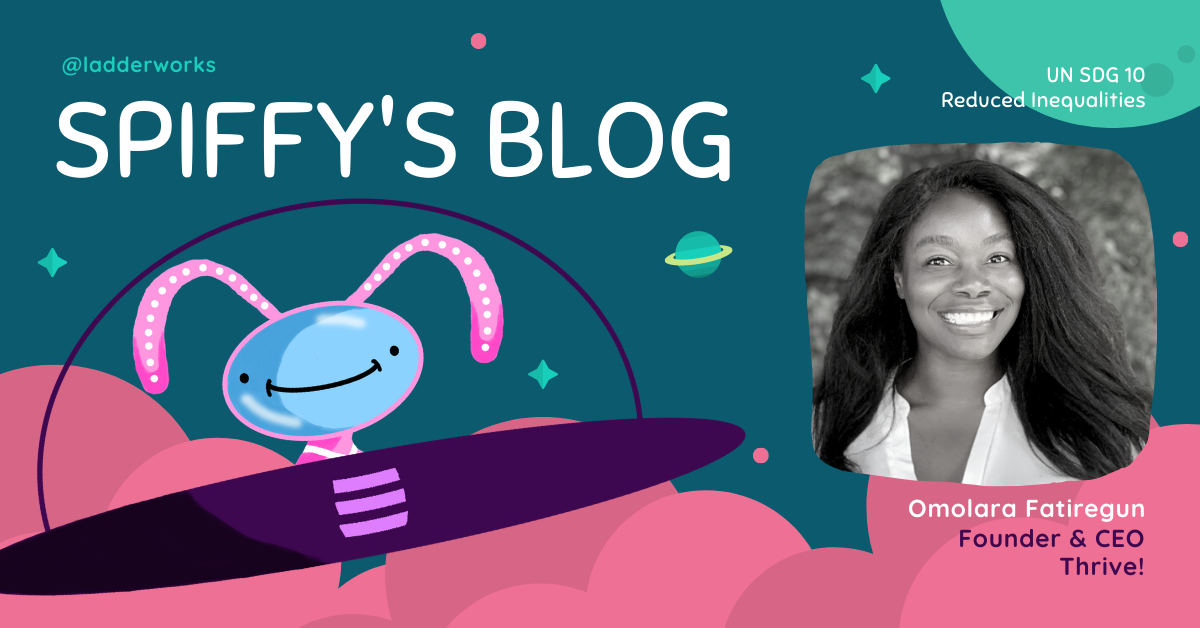Omolara Fatiregun: Paving the Way for Economic Mobility and Racial Justice
 Welcome back! Spiffy here, your interplanetary journalist reporting from Planet Earth with an eye on entrepreneurs working to make this world more equitable. Today I’m super excited to speak with Omolara Fatiregun, founder and CEO of Thrive! She is laser-focused on SDG #10: Reduced Inequalities and SDG #17 Partnerships for the Goals. Are you ready to be inspired?
Welcome back! Spiffy here, your interplanetary journalist reporting from Planet Earth with an eye on entrepreneurs working to make this world more equitable. Today I’m super excited to speak with Omolara Fatiregun, founder and CEO of Thrive! She is laser-focused on SDG #10: Reduced Inequalities and SDG #17 Partnerships for the Goals. Are you ready to be inspired?
Spiffy: Welcome Omolara, I’m really excited to hear what challenges you’re addressing through your start-up, Thrive! What can you tell me?
Omolara: Well, Spiffy, intergenerational cycles of poverty are the legacy of racism in America. Poverty fuels crime, the school-to-prison pipeline, and toxic stress—all of which wreak havoc on communities of color. State and local governments spend $3 trillion every year on services that can transform millions of lives. But too often governments invest more in the police than schools; more in foster care than in prenatal interventions. And these decisions only perpetuate cycles of poverty in communities of color.
Spiffy: What motivated you to tackle this?
Omolara: I have been working to improve the lives of vulnerable Black and Brown communities for more than fifteen years. This is my life’s work. But the summer of 2020 sparked something new in me and catalyzed my desire to embrace entrepreneurship. In the midst of our nation’s racial reckoning, I grew frustrated that we were having conversations about racial justice without discussing economic justice and cycles of poverty in Black and Brown communities. So, I harnessed all of my anger and tapped into my professional training to contribute to a solution.
Spiffy: That's amazing! How is it going? How is Thrive! working to create a more equitable world?
Omolara: Thrive! helps local governments and residents co-construct a tangible racial justice agenda centered on economic mobility. We have developed software that compiles the impact evaluation literature and best practices from communities of color on how to reduce disparities. Then we check agency budgets for investment in programs and practices that we know work. Our software also assesses the extent to which governments share power and decision-making with communities of color. Based on this analysis, we partner with government officials and residents to co-create budgets and policies to improve economic mobility and reduce disparities.
Spiffy: Do you have any milestones that you’ve reached? What impact do you anticipate?
Omolara: Earlier this year, we began sharing our work. Now, a dozen city and county governments across eight states have inquired about our software. My dream is that hundreds of governments in all 50 states get access to the tools they need to make more equitable budgeting decisions. We have the ability to empower and transform the lives of 38 million Americans living in poverty—particularly people of color.
Spiffy: I’m curious if you can share about an experience when you faced failure and didn't give up. What did you learn from failure?
Omolara: Last month, I started a week by losing two pitch competitions. By the end of that same week, four investors reached out to discuss my venture and I advanced in two additional competitions. From this experience, I learned that losing doesn’t make you a loser.
Spiffy: Is there anything else you would love to tell our audience?
Omolara: I know we can do better as a nation. I am the proud daughter of a single, (formerly) low-income, immigrant mom. My mom was able to find a way out of poverty, achieve the American dream, and send both of her kids to Harvard. But this only happened because my family had access to opportunities. As a nation, let’s make a commitment to creating opportunities for everyone to thrive.
Spiffy: With you making a contribution, I have confidence it will happen. Thanks so much for telling me about your work, Omolara, it’s been an honor!
Omolara Fatiregun is the founder and CEO of Thrive! She has been an impact evaluator, a cabinet-level official in DC’s juvenile justice agency, and a foundation executive. Omolara holds a bachelor’s degree in sociology and African American studies from Harvard University, and a master of arts in public policy from Georgetown University. She is currently completing a doctorate in education leadership at Harvard University. (Nominated by Harvard Innovation Labs. First published on the Ladderworks website on May 7, 2021.)
© 2021 Ladderworks LLC. Edited by Jill Landis Jha. Spiffy’s illustration by Shreyas Navare. Follow Spiffy’s stories of founders building a more equitable world at www.ladderworks.co/blogs/spiffys-blog


